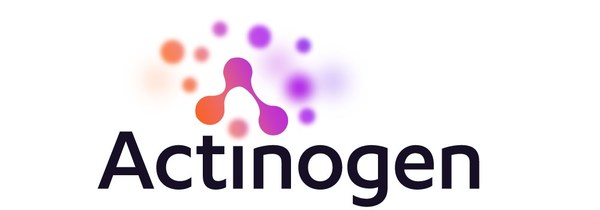- By PR Newswire
- Feb 06, 25

CISION PR Newswire - ซิชั่น พีอาร์ นิวส์ไวร์


 |
Late-stage Alzheimer's trial opens 10 new sites in USA, with results due in 2025 and 2026
SYDNEY, Feb. 5, 2025 /PRNewswire/ -- Actinogen Medical Limited (ASX: ACW) announces that the World Health Organization (WHO) has granted the nonproprietary name of 'emestedastat' to Actinogen for its Xanamem®/UE2343 once-a-day small molecule in accordance with the WHO's Procedure for the Selection of Recommended International Nonproprietary Names (INN) for Pharmaceutical Substances.
An INN is a unique, globally recognized name for a pharmaceutical drug or active ingredient. Each active substance that is to be marketed as a pharmaceutical must be granted a unique name of worldwide acceptability to ensure the clear identification, safe prescription and dispensing of medicines to patients. Nonproprietary names are intended for wide use ranging from labelling and product information to drug regulation and scientific literature.
The declaration of the new and unique suffix '-stedastat' identifies a new class of drugs that are 11β-HSD1 enzyme inhibitors. Xanamem's mechanism of action is to target and block the 11β-HSD1 enzyme in the brain and thus control levels of cortisol (also known as the 'stress hormone'). This means that Xanamem is a unique orally administered molecule in its own class as a 'tissue cortisol synthesis inhibitor' and it is the first drug to be named by the WHO in that class.
Dr Steven Gourlay, Actinogen's CEO and Managing Director, said:
"It is pleasing to have emestedastat (Xanamem or UE2343) recognized as first-in-class with the award of an INN name with a new and unique suffix. The suffix used in the name highlights Actinogen's leading position in the field of 11β-HSD1 enzyme inhibition which is designed to control brain cortisol and result in clinically meaningful benefits for patients with Alzheimer's disease (AD) and major depressive disorder (MDD)."
"Based on the clinical benefits seen in phase 2 trials with the 10mg daily dose of emestedastat in both AD and MDD, we have a high level of confidence in the likely positive outcomes of current and future trials in these and other diseases."
XanaMIA Alzheimer's disease phase 2b/3 trial sites enrolling in the USA and Australia
The XanaMIA phase 2b/3 clinical trial in patients with biomarker-positive mild to moderate Alzheimer's disease (AD) is picking up pace as clinical sites ramp up activity with all 25 sites now actively pre-screening potential trial participants. More than 300 people have been pre-screened with a blood pTau test and approximately 40 have entered the 36-week treatment phase of the trial. Final results are expected in the second half of 2026 with interim results[1] anticipated in Q4 this year.
The XanaMIA AD trial is enrolling 220 participants with mild to moderate AD and elevated levels of the blood biomarker pTau181, designed to identify participants with biomarker-positive AD whose disease is likely to progress during the 36-week treatment period. This design augments the ability to detect a Xanamem 10 mg daily treatment benefit vs. placebo over the observation period, as suggested by the analysis of pTau-positive patients in a previous phase 2a trial over 12 weeks (Taylor et. al. 2024). The primary endpoint of the trial is the Clinical Dementia Rating – Sum of Boxes scale, universally included in contemporary AD trials. Other measures include the effects of Xanamem on clinical endpoints of cognition and functional ability.
Patients or families interested in participating in the XanaMIA phase 2b/3 AD trial in the USA or Australia can seek further information and check for eligibility to join the trial by visiting the company's website.
Preparing for commercialization
Actinogen is actively engaging in an important range of initiatives to prepare for the approaching commercialization phase for Xanamem.
In October last year, the Company appointed Andrew Udell as Chief Commercial Officer, based in the US.
It is also preparing for regulatory meetings with the FDA for AD and MDD to better define marketing approval criteria, and maintaining discussions with potential co-development partners.
Progress towards commercial readiness continues in other areas including the scaling up of drug substance manufacturing, publication of peer-reviewed manuscripts describing clinical trial results, and the planning and conduct of ancillary nonclinical and clinical studies appropriate to Xanamem's late-stage of clinical development.
The Company continues to add new patents to its patent portfolio to potentially extend commercial protection into the 2040s, while remaining confident in the additional protection afforded for Xanamem as a new chemical entity from data exclusivity laws. These laws are designed to encourage developers to bring novel therapies to market. They prevent generic manufacturers from using Actinogen's clinical or nonclinical date for circa 5 to 10 years (depending on jurisdiction) from the date of marketing approval, effectively blocking generic competition for that period.
About Actinogen Medical
Actinogen Medical (ACW) is an ASX-listed, biotechnology company developing a novel therapy for neurological and neuropsychiatric diseases associated with dysregulated brain cortisol. There is a strong association between cortisol and detrimental changes in the brain, affecting cognitive function, harm to brain cells and long-term cognitive health.
Cognitive function means how a person understands, remembers and thinks clearly. Cognitive functions include memory, attention, reasoning, awareness and decision-making.
Actinogen is currently developing its lead compound, Xanamem, as a promising new therapy for Alzheimer's Disease and Depression and hopes to study Fragile X Syndrome and other neurological and psychiatric diseases in the future. Reducing cortisol inside brain cells could have a positive impact in these and many other diseases. The cognitive dysfunction, behavioural abnormalities, and neuropsychological burden associated with these conditions is debilitating for patients, and there is a substantial unmet medical need for new and improved treatments.
Clinical Trials
The XanaMIA Phase 2b/3 Alzheimer's disease trial is a double-blind, 36-week treatment, placebo-controlled, parallel group design trial in 220 patients with mild to moderate AD and progressive disease, determined by clinical criteria and confirmed by an elevated level of the pTau181 protein biomarker in blood. Patients receive Xanamem 10 mg or placebo, once daily, and its ability to slow progression of Alzheimer's disease is assessed with a variety of endpoints. The primary endpoint of the trial is the internationally-recognized CDR-SB (Clinical Dementia Rating scale – Sum of Boxes). The trial is being conducted in Australia and the US. Initial results from an interim analysis of the first 100 participants are anticipated in Q4 2025 and final results H2 2026.
The XanaCIDD Phase 2a depression trial was a double-blind, six-week proof-of-concept, placebo-controlled, parallel group design trial in 167 patients with moderate, treatment-resistant depression and a degree of baseline cognitive impairment. Participants were evenly randomized to receive Xanamem 10 mg once daily or placebo, in most cases in addition to their existing antidepressant therapy, and effects on cognition and depression were assessed. Trial results were reported in August 2024 and showed clinically and statistically significant benefits on depression symptoms with positive effects on the MADRS scale (a validated scale of depression symptom measurement) and the PGI-S (a valid patient reported assessment of depression severity).
About Xanamem (emestedastat)
Xanamem's novel mechanism of action is to control the level of cortisol in the brain through the inhibition of the cortisol synthesis enzyme, 11β-HSD1, without affecting production of cortisol by the adrenal glands. Xanamem is a first-in-class, once-a-day pill designed to deliver high levels of cortisol control in the brain.
Chronically elevated cortisol is associated with progression in Alzheimer's Disease and excess cortisol is known to be toxic to brain cells. Cortisol itself is also associated with depressive symptoms and when targeted via other mechanisms has shown some promise in prior clinical trials. The recent XanaCIDD trial demonstrated clinically and sometimes statistically significant benefits on depressive symptoms.
The Company has studied 11β-HSD1 inhibition by Xanamem in approximately 400 volunteers and patients in eight clinical trials. Xanamem has a promising safety profile and has demonstrated clinical activity in patients with depression, patients with biomarker-positive Alzheimer's disease and cognitively normal volunteers. High levels of target engagement in the brain with doses as low as 5 mg daily have been demonstrated in a human PET imaging study.
Xanamem is an investigational product and is not approved for use outside of a clinical trial by the FDA or by any global regulatory authority. Xanamem® is a trademark of Actinogen Medical.
Disclaimer
This announcement and attachments may contain certain "forward-looking statements" that are not historical facts; are based on subjective estimates, assumptions and qualifications; and relate to circumstances and events that have not taken place and may not take place. Such forward looking statements should be considered "at-risk statements" - not to be relied upon as they are subject to known and unknown risks, uncertainties and other factors (such as significant business, economic and competitive uncertainties / contingencies and regulatory and clinical development risks, future outcomes and uncertainties) that may lead to actual results being materially different from any forward looking statement or the performance expressed or implied by such forward looking statements. You are cautioned not to place undue reliance on these forward-looking statements that speak only as of the date hereof. Actinogen Medical does not undertake any obligation to revise such statements to reflect events or any change in circumstances arising after the date hereof, or to reflect the occurrence of or non-occurrence of any future events. Past performance is not a reliable indicator of future performance. Actinogen Medical does not make any guarantee, representation or warranty as to the likelihood of achievement or reasonableness of any forward-looking statements and there can be no assurance or guarantee that any forward-looking statements will be realised.
® Xanamem is a registered trademark of Actinogen Medical Limited |
[1] An interim analysis is planned when approximately 100 patients reach 24 weeks of treatment |


Comment :